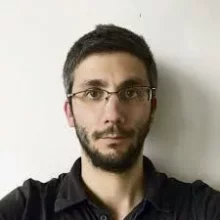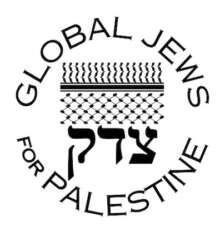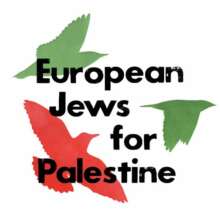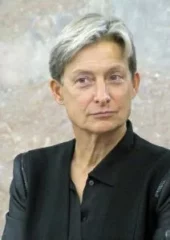AN INTERVIEW WITH MAXIME BENATOUIL
Emmanuel Macron has described anti-Zionism as a new form of antisemitism. Yet by associating all French Jews with the state of Israel, he risks fueling resentment between the victims of racism.
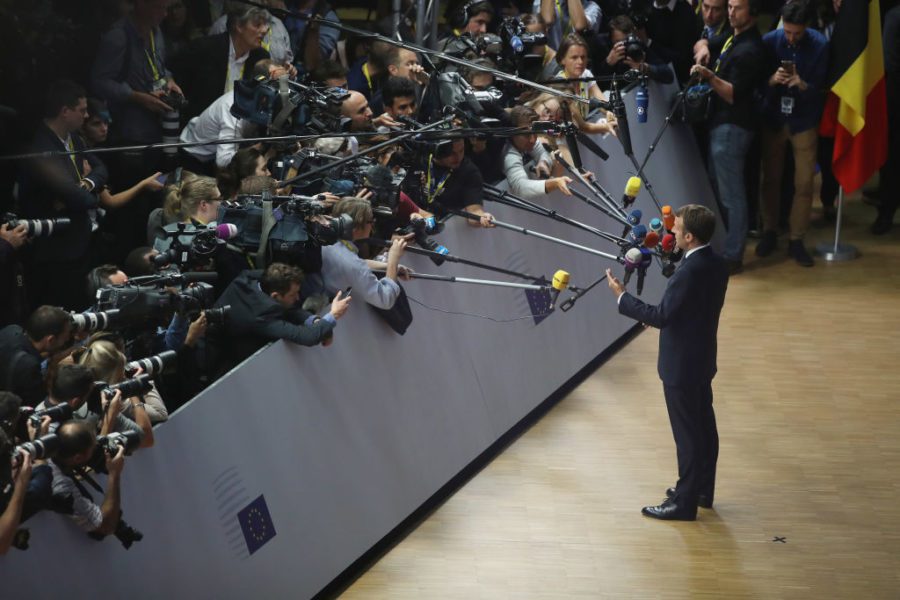
French President Emmanuel Macron arrives at the October Euro Summit on October 17, 2018 in Brussels, Belgium. Sean Gallup / Getty Images
INTERVIEW BY David Broder
If we take Emmanuel Macron’s word for it, France has an increasing problem with antisemitism. Last week the president addressed the country’s Representative Council of Jewish Organizations, declaring a rise in antisemitism “without precedent since World War II.” Already on February 11 his interior minister had reported that 2018 saw a 74 percent rise in attacks on Jews. Government sources have also linked this development to the gilets jaunes protests, as ministers blamed this “brown plague” for the racist vandalization of a Paris bagel shopand recent attacks on journalists.
Yet many French Jews are critical of this attempt to weaponize antisemitism claims. The reports of gilets jauneinvolvement in the bagel shop attack soon proved unfounded, and the president’s attempt to deem anti-Zionism a new form of antisemitism have blurred the distinction between Jews and Israel. At the same time, antiracist Jews have emphasized the dangers of a double-standard approach which fails to take Islamophobia and anti-black racism as seriously as antisemitism.
For Maxime Benatouil, a leading member of the French-Jewish Union for Peace (UJFP), the fight against antisemitism has to be combined with a consistent defense of minorities. He spoke to Jacobin’s David Broder about the presence of antisemitic attitudes among the gilets jaunes protests, Macron’s bid to weaponize attacks on Jews, and the danger of setting minorities against one another.
DB : Philosopher Bernard-Henri Lévy has said that antisemitism is at the heartof the gilets jaunes movement. His remarks fit into a wider narrative where ministers and pro-Macron press have painted the movement as far-right orled by fascists. Is there any evidence that anti-establishment or conspiratorial ideas among the gilets jaunes link up with antisemitic themes?
MB : Bernard-Henri Lévy’s comments are symptomatic of the reaction against the gilets jaunes. This is a real social movement of the working and popular classes and has emerged outside of the established political structures that traditionally framed their activity. It is true that there have been signs of antisemitism in this movement, which the French media have especially focused on, and there have also been figures on the protests like ex-comedian Dieudonné [known for his use of the quenelle salute and promotion of antisemitic themes].
But there is no particular antisemitism among the gilets jaunes as such, any more than in the rest of French society. And even insofar as their movement does reflect the wider society, as it has grown it has become more politicized and there has been more pushback among the gilets jaunes’ ranks against racism, sexism, homophobia, and indeed antisemitism. In this sense, the movement’s political development has been truly amazing.
DB : There is nonetheless evidence of rising attacks on Jews, most graphically illustrated by the murder last year of Holocaust survivor Mireille Knoll. Indeed, it has been reported that there has been a 74 percent rise in antisemitic incidents in France. What do you think lies behind this?
MB : It’s terrible that so many antisemitic incidents take place — it was reported that there were 531 such incidents last year. But I’m not sure it’s a very good idea to present these figures in this way. While the figures the Interior Ministry provided to the French media reported this as a 74 percent rise year-on-year, in fact as recently as ten years ago the number of such incidents was around eight hundred a year, much higher than now. Perhaps the decision to speak of a rise without giving a sense of the general trend was an error, or maybe there are political reasons for wanting to paint this picture.
The government is trying to suggest that there is a rise in antisemitic incidents connected to the gilets jaunes — for example, when there was racist graffiti on a bagel store in Paris, the fact that it was in yellow paint was taken by the government as evidence that it came from these “yellow vests” protesters, and ministers tweeted to that effect. But it turned out the graffiti had appeared two days before the demonstration concerned, and in any case not on its route.
DB : There was a media storm last week after writer Alain Finkielkraut was called a “dirty Zionist” to his face by agilets jaune. While the word “Zionist” may or may not be used as a codeword for “Jew,” don’t you think that this kind of incident leaves the movement open to criticism, or at least gives the impression of not showing solidarity with Jews in the face of antisemitism?
MB : Finkielkraut is a well-known conservative writer and is indeed a Zionist, with a long record of anti-Palestinian polemics. But to call him a “dirty Zionist” or say “go back to Tel Aviv” can clearly have an antisemitic dimension.
As well as recognizing this, it’s also worth clarifying two things about Finkielkraut and this incident. He immediately sought to instrumentalize it as if he were himself an antiracist. But it was hardly as if some random Jewish citizen, perhaps wearing a kippah, happened to be passing by the demonstration and was then harassed by gilets jaunes.
Rather, Finkielkraut is a well-known public figure. Indeed, he is himself known for racist attacks, for instance in an interview with Ha’aretz a few years ago in which he called the French soccer team “black-black-black” [subverting a common description of its multiracial, “white-black-Arab” character], complaining that there were not enough white players.
Finkielkraut works for one of the main public radio stations and he invited an even more conservative Jewish polemicist, Éric Zemmour onto his show. Zemmour whitewashed the legacy of Marshal Pétain’s Vichy regime, claiming that he had tried to save French Jews and such like.
So of course, these incidents are bad and should not happen, but can hardly be used by such figures in order to characterize the gilets jaunes as feeding antisemitism.
DB : In the wake of the incident with Finkielkraut, last Tuesday there were two different protests against antisemitism in Paris: what divided them?
MB : They represented two very different conceptions of what “antiracism” means. Earlier I spoke of political instrumentalization, and indeed one of the protests was called by the Parti Socialiste (PS), in an apparent bid to rally support behind itself. The PS had long been a major party, but it slumped to 6 percent of the vote in the 2017 presidential election and was forced even to quit its historical headquarters.
Seeking to revive its base, it called a demonstration including the main parties, or at least Emmanuel Macron’s La République en Marche and the right-wing Républicains. The rally was a vehicle for gathering together the parties of the political center and right.
Not only was Marine Le Pen’s Rassemblement national (ex–Front National) not invited, but nor, at first, was La France Insoumise. This was a bid to instrumentalize antisemitism, the aim being to give the impression that Jean-Luc Mélenchon’s party doesn’t give a shit about this problem. Conservative and racist figures were, however, included in the march called by the Parti Socialiste, including Éric Ciotti, an MP for the Républicains who wanted to introduce measures to ban the wearing of religious symbols, notably by hijab-wearing women, who accompany kids for out-of-school activities.
For us of the French-Jewish Union for Peace (UJFP) — a Jewish antiracist and anti-Zionist organization — it makes no sense to demonstrate hand-in-hand with people like that. At the same time, forces on the Left — France Insoumise, the Communist Party, but also those like the Parti des Indigènes de la République, whose spokesperson Houria Bouteldja has for years faced baseless, defamatory attacks, probably because she is an Arab woman who stands for justice — should not get caught up in a bullshit debate about whether they are “antisemitic,” like has already been whipped up in the British and American contexts.
On Tuesday we of the UJFP instead helped organize a separate demonstration which insisted on the need to make the fight against antisemitism part of a consistent antiracism. The demonstration in Paris’s Menilmontant district was held together with the New Anticapitalist Party and other organizations, such as the Indigènes de la République and other groups representing Arab workers and people of African descent.
We can’t fight racism in a way that just absolves the state of its own responsibility for promoting antisemitism, Islamophobia, anti-Black and anti-Roma racism, and indeed the destructive dynamic created when it tries to prioritize fighting one form of racism over the others.
DB : Enzo Traverso has pointed to the feeling of discrimination that can arise when the state takes the racism against some minorities less seriously than others — making them feel that they are less valued and protected. Yet at the same time as the French state proclaims its fight against antisemitism, it’s notable how little its leaders have pushed back at the idea that Jews are not safe in France, for instance, when after the Paris attacks in November 2015 the Israeli premier Benjamin Netanyahu made out that French Jews ought to move to Israel in order to have real security. How can antiracism be detached from “competitive victimhood” or setting minorities off against each other?
MB : In 2017 Emmanuel Macron staged the first commemoration of the “Vel d’Hiv” raids, where Jews were rounded up at a velodrome in Paris before then being transported to the death camps in Germany. Outrageously, he did this together with Benjamin Netanyahu, with the effect that the head of a foreign power was portrayed as if he were a representative of French Jews, and thus as if these latter citizens were less French. At this event Netanyahu was very pleased, however, to hear Macron portray anti-Zionism and the Boycott, Divestment, and Sanctions (BDS) campaign as a dangerous new form of antisemitism.
What we would like would be for French society and the French state to take every racism as seriously as they do antisemitism. The fight against attacks on Jews cannot be pursued in a way that also feeds Islamophobia or targets other minorities. We are thus trying to create an antiracist space where we can collaborate and strategize with other antiracist movements in a way which isn’t limited to responding to the latest antisemitic outrage and then saying nothing else about racism.
To take one example of this, when Holocaust survivor Mireille Knoll was murdered and then there was a rally against antisemitism, we certainly didn’t feel like taking part in a demonstration that also included the Front National (FN). In fact, on that occasion even the Jewish Defense League, a far-right and ultra-Zionist organization, did not want to stay silent about the FN’s presence either. The state’s particular way of fighting antisemitism, discounting other racisms while presenting any attack on a Jewish citizen as an attack on the entire French Republic, can in part fuel conspiratorial thinking and resentment against Jews, if they are seen as protected in a way that others are not. We are doing much more to fight antisemitism when we fight against all racism than when we treat it in total isolation.
DB : In recent days, Emmanuel Macron has proposed to classify “anti-Zionism” as itself a form of antisemitism. There was even the suggestion this could lead to new legislation to criminalize some forms of criticism of Israel. What exact measures do you expect this to involve?
MB : Anti-Zionism and opposition to Israel are a political opinion which should not in any case be restricted by law. Of course, anti-Zionism is an idea that can have many different meanings, from the widespread opposition among Jews to the Zionist project, before the establishment of the State of Israel in 1948, to the position of those who do not want to destroy Israel but rather to make it into a state of all of its citizens, including the around 20 percent of the population who are Palestinian-Arabs. Recently, of course, the nation-state law instead dropped the official status of Arabic in Israel and imposed an even harsher discrimination against Palestinians.
Emmanuel Macron was invited to address the dinner of the Council of Organizations Representing Jews (CRIF), which despite a more progressive past has become a very right-wing, pro-Israel force among French Jews — almost like a second Israeli Embassy — albeit one which French media often present as the voice of the whole “Jewish community.” It is much more right-wing and soft on neo-Nazis even than AIPAC. We can see this in its complete lack of reaction to Netanyahu’s move to offer top positions to Kahanists (Jewish supremacists, who staunchly resist criticism of the killing of Palestinians) if he is reelected.
CRIF has been pushing for anti-Zionism to be classified as antisemitic, and when Macron spoke at its dinner he said that behind opposition to the existence of Israel there stood “the negation of the Jew.” He said that the definition of antisemitism put forward by the International Holocaust Remembrance Alliance (IHRA) should be adopted into law, including the specific examples it lists. These latter have already caused controversy in the Labour Party in Britain, because they specify that it is antisemitic to say that “the existence of a state of Israel is a racist endeavor.”
This would imply that a critic of settler colonialism could be considered an “antisemite” on the basis that they are opposed to “Jewish people’s right to self-determination.” It is uncertain what specific moves are going to be made. But given that Macron has spoken of inserting the IHRA definition into the penal code, this would further criminalize and impede the work of the French BDS campaign and the movement in solidarity in Palestine.
As yet the parties of the Left — such as France Insoumise (LFI) and the French Communist Party — have kept rather quiet about their criticisms of this move, because they do not want to be dragged into another row over the issue. They have not shown much courage, here. Adrien Quatennens, a young and bright LFI MP, did say it’s “not a very good idea.”
But we as a Jewish anti-Zionist organization are responding more firmly. We together with our allies will resist this attack on freedom of speech. As consistent opponents of antisemitism and consistent antiracists we will defend the right to criticize Israel and — above all — to show solidarity with the Palestinians.View online : this article on jacobin’s website






